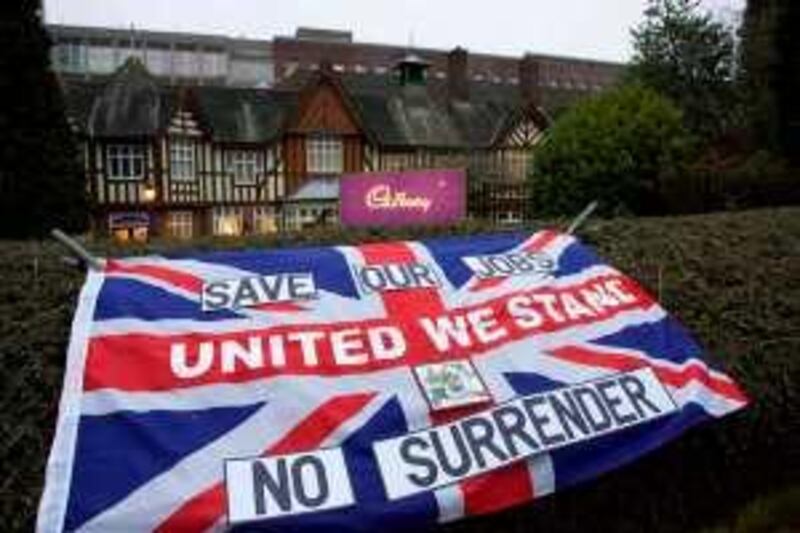Todd Stitzer, the chief executive of Cadbury, is likely to pick up £12 million (Dh71.87m) in cash and shares from the chocolate maker's £11.9 billion sale to the US food giant Kraft. The deal will also see an army of business advisers pocket fees of £250m, a report in the British newspaper The Guardian revealed.
News of Mr Stitzer's bumper payday came just hours after Cadbury workers reacted angrily to the sale of the British High Street icon to a major US company. "The scale of the payments for Todd Stitzer contrasts sharply with the uncertainty faced by thousands of Cadbury factory workers, after the group's chairman Roger Carr admitted he had put shareholders first and job losses were inevitable," The Guardian reported.
"Investment bankers, lawyers, accountants and PR advisers racked up fees at a rate of more than £2m a day during the battle for control of Cadbury in the latest sign that it is business as usual in the City [of London], barely 15 months after the fall of Lehman Brothers brought the financial system to the brink of collapse." For staff at Cadbury's sprawling Bournville site outside the city of Birmingham, England, the mood was grim as they lamented the decision that a beloved national brand was falling into US hands.
"Hang your heads in shame", read one banner, capturing a feeling at the company's home that patriotic pride as well as future prospects for staff were at stake after Kraft's takeover bid was approved by Cadbury. "It is history, and what is England without its history?" asked Janet Wright, 59, a machine operator, who started work at the factory when she was 15. But Mr Carr was unrepentant about the decision to sell Cadbury and its famous brands such as Diary Milk, Creme Eggs, Flake and the Crunchie bar to the maker of Oreo cookies.
"We have done nothing wrong," Mr Carr told The Guardian. "We have done the role that is required of us. We don't own the company, the shareholders own the company and the board has a fiduciary duty [to recommend an offer] when appropriate value has been paid." But the £11.9bn deal has raised fears that jobs will be cut at Cadbury factories in the UK and Ireland. Gordon Brown, the UK prime minister, has pledged to protect investment and workers' rights, illustrating the political sensitivity of the takeover in an election year for British voters.
"We are determined that the levels of investment that take place in Cadbury in the United Kingdom are maintained," he said. "We are determined that at a time when people are worried about jobs that jobs in Cadbury can be secured." The chocolate maker has been in Bournville since 1879 and the sense of community remains strong there, compounding the disappointment felt by the workforce. About 2,500 staff work at the complex, which consists of sturdy 19th-century brick buildings, monolithic structures in the style of the 1930s and square blocks reminiscent of the 1960s stretching as far as the eye can see and reflecting the company's long history.
"It's not just about jobs, it's also about being British. It's the end of a great British company," said one woman, 51, who did not wish to give her name but said she had worked at the factory for 31 years and had met her husband there. The company's Quaker-inspired tradition of caring for staff, established by its founders, is still in evidence despite the family retreating from the day-to-day running of the business.
Bournville has a dentist, chiropodist, swimming pool and pensioners' club, and a clock tower stands over a war memorial decorated with poppies paying tribute to dozens of Cadbury workers who died in the two world wars. Some workers live in company houses at discounted rents, and when the supermarket chain Tesco opened a store there it was barred for a time from selling alcohol. Myriam Jordan, 82, who worked for Cadbury for 15 years, as did her father-in-law for 46 years, still receives a free Cadbury parcel at Christmas and a free trip every year. "It adds a bitter taste having an American company buy Cadbury's," she said, returning from the pensioners' club.
But some felt the great Quaker tradition had disappeared over the years, with diminishing pension and pay packages. "They set up a great legacy but all that has gone," said Pete, 48, who declined to give his second name. He had worked in production for 17 years. He, too, was despondent about the probable takeover. "Better the devil you know," he said. * with Reuters





